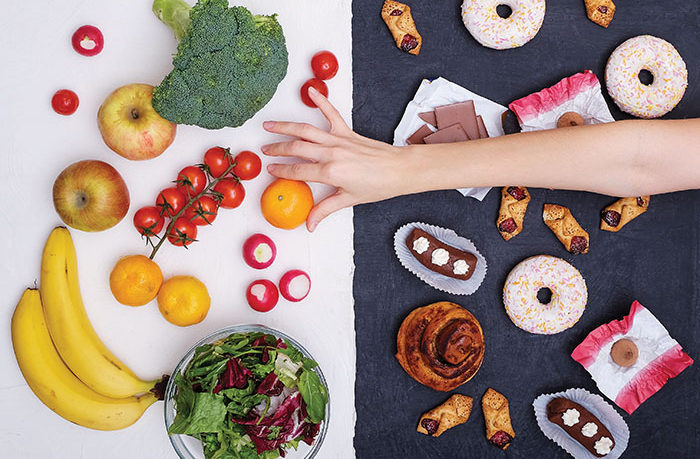An interview with Dr. Razan Dukmak
BY FARIHA FARUK ESHRAT
Your dietary habits can have lasting effects on your health, including your risk for cancer. According to the USDA, up to one-third of cancers could be prevented just by changing our diet. So, what are some changes we can make to ward off cancer? To find out, we sat down with Dr. Razan Dukmak, a clinical dietician at King Faisal Specialized Hospital and a lecturer at Al Faisal University.
1. Eat fruits and vegetables.
Your diet has a powerful effect on your body. By following the appropriate diet, you can lower your risk of developing cancer. You can never go wrong with a plant-based diet. The current daily intake recommendation is five servings of fruit and vegetables every day (we cannot emphasize this enough!).
One of the most important chemicals in plants are antioxidants. They combat free radicals which can damage our DNA and change the proteins that we make. Vitamins E and C are antioxidants along with minerals like Selenium, Zinc and Copper. We always encourage people to include lots of fresh fruits and vegetables in their diet to get enough of these nutrients. It’s important to consume more non-starchy vegetables like leafy greens and dark or brightly colored foods like berries, grapes, oranges, and carrots.
Foods high in lycopene, such as tomatoes, guava, and watermelon can also help to lower your risk of cancer.
Another important nutrient in plants is fiber. Fibers can greatly reduce your risk of colon cancer. As they reduce the fat in your diet, they can also help reduce your weight and further reduce your risk for cancers like breast cancer. Brown rice, wheat and flaxseeds seeds contain high amounts of this nutrient.
Finally, it’s important we address the media coverage of phytoestrogen chemicals like isoflavones, found in cabbage and soy, and their correlation with a lower incidence of breast cancer. According to the latest CDC consensus, there is no evidence that clearly shows this. But cabbages and soy products are still very healthy for their other nutrients. It is important to always assess the truth to any media story from scientific sources or your nutritionist.
2. Choose your proteins.
“Limit your intake of processed and red meats and trade them for healthier, natural sources of protein such as fish, chicken, eggs, nuts and soy. Many studies have proven a link between the risk of cancer and eating processed meats such as sausages and salami. Just eating 50 grams of processed meat a day increases your risk of colon cancer by 20%. Remember to practice the same reservation while eating smoked, charred or preserved meats as their production process can produce carcinogens.
3. Consume dairy products.
Studies have shown that a lack of vitamin D can promote the growth of different forms of cancers. As Vitamin D affects your body like a hormone, it can affect the integrity of your organs. Vitamin D is abundantly found in dairy products so be sure to include two servings of dairy in your diet.
Although some media articles have emphasized the anti-cancer effects of probiotics found in yoghurt or laban, there are no studies supporting this. Thus there are no added benefits of their consumption.
4. Prepare your food properly.
Raw fruits and vegetables tend to have the highest amounts of vitamins and minerals. If cooking vegetables, be careful to not overcook them and only steam them until tender. If you like to boil your vegetables, use the water for a soup to not lose any of the beneficial nutrients.
When cooking meats, we recommend low-heat cooking or baking to prevent oils or fats from turning carcinogenic. Also, do not overcook your meat when doing a barbecue as the charred bits contain carcinogens.
Finally, always use microwave-safe containers in the microwave as other plastics can release carcinogens when heated. Some microwavable popcorns have been shown to contain preservatives that can transform into carcinogens when microwaved so when in doubt, always use the stove.
5. Store your food appropriately.
Store nuts and oils in airtight containers in a cool, dark place because they quickly become rancid when exposed to heat, light, and air, especially vegetable oils as unsaturated fats (plant-based oils) are not as stable as saturated fats (animal-based). If you’re going to keep nuts for a few weeks, it’s best to keep them in the fridge.
Foods that look or smell moldy may contain a fungal toxin called aflatoxin, a strong carcinogen. So be careful to remove the black or moldy peanuts, rice, cereals, legumes and chickpeas before eating.
Smile, You’re BlessedEmail: Smile@alfaisal.eduInstagram, Snapchat, Facebook:smileurblessedTwitter: @smileur_blessed




